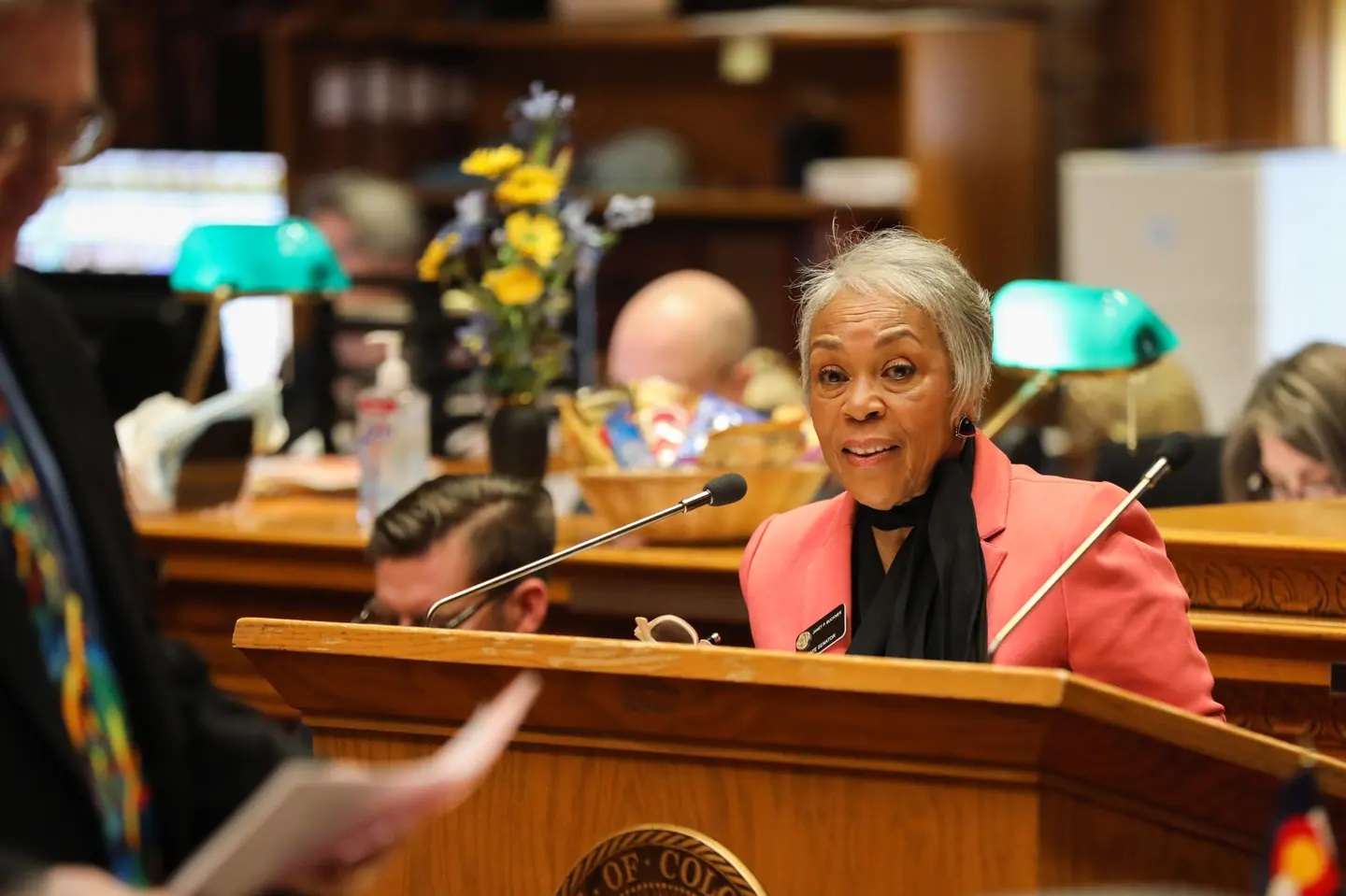Just a couple of weeks ago, the people of Colorado elected state senators to represent them in the Capitol for the next four years. But in two districts, the winning candidates have already handed in their resignations.
Democratic senators Chris Hansen and Janet Buckner both submitted letters of resignation weeks after they were re-elected to their seats in November. A third senator, Republican Kevin Van Winkle, announced his resignation shortly after he was elected a county commissioner, two years into his first four-year Senate term. Replacements for all three senators will be chosen via vacancy committees — groups led by the outgoing senators’ political parties, consisting of local precinct organizers, party officers and other registered members. The committees, which typically comprise a few dozen people, are a far cry from the tens of thousands of Coloradans who just voted Hansen and Buckner back into office.
Already, a lot of citizens are calling for a change to the state’s vacancy system.
The call for change is being led by the chairman of the Colorado Democratic Party Shad Murib who issued a statement calling for reform of the vacancy process after two Democratic state senators issued their resignations.

The Colorado Democratic Party has said the District 31 vacancy committee will convene in early January. The District 29 vacancy committee will announce its meeting date “as soon as possible,” according to the party.
According to Colorado Democratic Party Chairman Shad Murib, the vacancy process should be done away with as quickly as possible and was also quoted as saying the growing number of politicians serving in office under such a process “should concern every Coloradan.”
“Regardless of the high standards we place on ourselves to run as great a vacancy committee process as law allows, the fact remains that vacancy committees are small and don’t provide for the same type of public input and scrutiny as a traditional election,” Murib said.
Murib concluded his statement by saying the Colorado Democratic Party “is committed to running a neutral process for these vacancy committees, and will strive to ensure that every candidate is treated fairly and has to vigorously compete to serve.”
The Colorado Democratic Party isn’t alone. The state Republican Party is also discussing reform options, and the Libertarian Party is speaking harshly against the current system, saying the vacancy committee process “undermines the very essence of democratic representation” in a social media post responding to the resignations.
Critics say the vacancy system allows state legislators to strategically step down after elections instead of beforehand to ensure their party maintains control of their district or to have a stronger say in who replaces them — but Buckner, Hansen and Van Winkle claim that’s not the case for them.
Why They Resigned
State Sen. Janet Buckner who is in her late 70s and is chair of the Senate Education Committee submitted a letter of resignation to legislative leadership and said in a written statement that she will resign Jan. 9, one day after Colorado’s 2025 lawmaking term begins, “to prioritize my family and health.
“Serving the people of Aurora in the Colorado General Assembly in both the House and Senate for the past nine years has been an honor of a lifetime,” she wrote in her formal resignation letter. “I am proud of the work we’ve accomplished to better the lives of all Coloradans and I look forward to contributing to my community in new capacities.”

“The past year has been very challenging,” Buckner says. “People sometimes forget that lawmakers are human, too, facing life’s unpredictabilities just like anyone else.”
Buckner’s niece and her godson recently passed away, she says. On top of mourning those deaths, Buckner experienced a health scare in the fall that turned out to be a false alarm. Upon leaving office in January, Buckner says, she wants to spend time with her family and mentor members of her community on how to run for public office.
Buckner represents Senate District 29 in Arapahoe County. She ran unopposed in the general and primary elections this year. Her district is solidly blue, leaning 29.4 percent in favor of Democrats, according to the state redistricting commission, so it wasn’t a seat the party was in danger of losing this election.
Buckner herself first entered the legislature via a vacancy committee, taking over her husband, John Buckner’s, House seat after he passed away in 2015. She says she trusts the vacancy process to find the right replacement for her, adding that she hasn’t endorsed anyone to fill the vacancy and doesn’t plan to.
State Sen. Chris Hansen has also tendered his resignation as he becomes CEO of the La Plata Energy Association. He won reelection in Senate District 31 by about 60,000 votes, easily beating his Libertarian challenger. Hansen was also previously appointed via a vacancy committee, replacing Senator Lois Court in 2020 after she resigned due to illness. He’s now leaving after being hired as CEO of La Plata Electric Association Inc.
Hansen will head the La Plata Electric Association, a nonprofit electrical cooperative that serves Durango, Pagosa Springs and other communities in southwest Colorado. He said he started going through the hiring process this fall.
“Ballots are finalized on September 5th, and so all of this for me happened after ballots were finalized,” said Hansen. “It felt like the right thing to do was to finish off the election, and then as soon as I made my decision about the job, make sure that folks knew about that and that we could set up a very orderly transition.”
Hansen was reelected to a second four-year term with 84 percent of the vote. His Denver district includes Capitol Hill, Wash Park and neighborhoods to the east. He’s served a total of eight years in the legislature, first in the House.
Colorado is one of only five states that use party-led vacancy committees to fill open legislative seats when a lawmaker resigns, is removed or dies before a term is finished. Most states use special elections to choose a replacement for legislators who leave office early; others allow the governor or Board of County Commissioners to appoint a replacement.
During the 2024 legislative session, nearly three in ten Colorado legislators had at one point been placed in the Statehouse via a vacancy committee. Next session, that number will be at least nineteen out of 100, with more possible depending on whether House representatives are chosen to fill the Senate openings, according to Colorado Politics.
Advocates of Colorado’s vacancy committee system champion it for being faster and cheaper than special elections, which can take months to accomplish and cost hundreds of thousands of dollars. The faster the vacancy process, the quicker the district’s citizens get representation in the State Capitol, they say. And while small, the vacancy committees put the decision in more hands than when the governor or county commissioners decide on their own.
Critics complain that the vacancy committees give only a few dozen party insiders the power to select a representative for up to 169,000 Coloradans. They view it as an easy way for more ideologically extreme candidates to get into office, since the appointees with their built-in incumbency advantage almost always win the following election. It also completely excludes unaffiliated voters, who make up more than 48 percent of Colorado’s active voters, from the process.
Debate over the vacancy system has been going on for years, and lawmakers had the chance to weigh in last session. Democratic Representative Bob Marshall introduced a bill that sought to prohibit vacancy-appointed legislators from running for the same office in the next immediate election, essentially making them interim legislators.
The bill passed one committee vote 7-4, but it died on the calendar without a full House vote. Marshall says he plans to bring the bill back next session.

During the committee debate early this year, opponents of Marshall’s proposal argued that it would dis-incentivize candidates from running for vacancies and make the openings feasible only for the wealthy or retired who can take on a position short-term without any hope of achieving future employment.
Other critics suggested that the legislature should focus on addressing reasons why legislators are resigning in the first place, such as low pay and a so-called toxic working environment.
“Let’s not ignore why there’s such a large number of vacancies,” Hansen says. “We should take a hard look at why it is largely unsustainable for people to serve in the General Assembly, especially if they have families. I think that’s part of the reform conversation we also need to take into account.”
Marshall’s proposed bill would send a ballot measure to voters, asking their permission to change the vacancy system via a constitutional amendment. It will need approval from two-thirds of state legislators to pass, meaning both Democrats and Republicans would need to get on board, since neither party will hold a supermajority in either the House or the Senate next session.
But if any issue can bring the two parties together, it might be this one.

